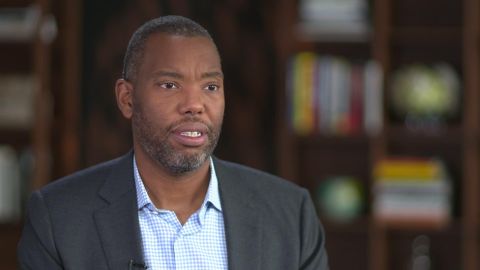Read Transcript EXPAND
CHRISTIANE AMANPOUR: Tell us about Hiram Walker. What were you trying to tell the world through this boy?
TA-NEHISI COATES, AUTHOR, “THE WATER DANCER”: There is a central trope running through “The Water Dancer.” At its core, it’s a book about memory. And how I — and I knew — I was pretty sure I wanted to write something about that, that I had. I moved to it being more of a supernatural, you know, aspect, in those mystical properties that you talked about because through much of the research I did, I actually had to read quite a bit of the literature of the first person accounts of enslaved black people of that period. And the way they talked about their experience was mystical. Oftentimes, they would talk about escapes. They would use, you know, sort of mystical language. Frederick Douglass would talk about another enslaved person who gave him a special group that would help him escape. There were, you know, methods that, you know, they believed in to help, you know, for instance throw off the dogs that were on their trail. So, it’s a mystical world that they lived in. Hey, I’m always attracted to that. I grew up on comic books. So, I had a natural attraction to that. And so, I just sort of I dug right into it. Harim is a young man who has a pretty natural sense of memory except when it comes to the things most intimate and arguably most important about himself. And so, “The Water Dancer” is a book about freedom. It’s about a young man who is seeking freedom but does not quite understand how complex that request actually is.
AMANPOUR: Fill in what you were just saying, except when it comes to the most important things about himself.
COATES: So, in this case, he has — he understands as a fact that his mother was sold off but he doesn’t remember his mother. He can’t, you know, remember her face. He can’t remember her doing things for them. He only knows what other people have told him. And I think what becomes pretty clear is that his act of forgetting is to, some extent, intentional. He has a mental block of. He can’t face what it means that his mother has been sold off because then he would have to draw certain conclusions about his father and indeed, the very world that he lives in.
AMANPOUR: Well, we’re going to talk about that. He does, actually, magic up his mother.
COATES: Yes.
AMANPOUR: He has this incident where by — and it’s very associated with the water. I don’t want to be a spoiler alert.
COATES: Yes, yes.
AMANPOUR: But he’s hovering between life and death and he sees his mother.
COATES: Yes.
AMANPOUR: Rose.
COATES: Yes.
AMANPOUR: And then, the story gets into how his father, this white master, sort of decides that he likes him, that he’s clever, that he wants to educate him.
COATES: Right.
AMANPOUR: Not many black slave boys are educated.
COATES: Right.
AMANPOUR: Describe the farmer who he does know.
COATES: So, I think what happens is the father — Harim’s father, Howell Walker, loves his son about as much as any white man in that system and in his position could love his black son. And what that results in is some degree of privileges that are afforded to Hiram. But nevertheless, he is still enslaved and he feels it.
About This Episode EXPAND
Imran Khan joins Christiane Amanpour to discuss rising tensions between India and Pakistan and his efforts to move Kashmir to the top of the world agenda. Ta-Nehisi Coates explains the vision behind his first novel “The Water Dancer.” London Breed tells Michel Martin about the challenges she’s tackling as mayor of San Francisco.
LEARN MORE


